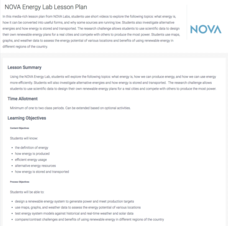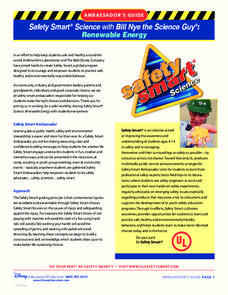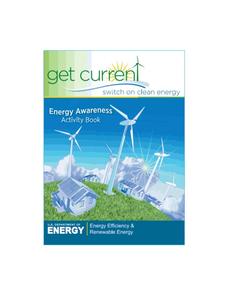NOAA
Energy from the Oceans
Can Earth's oceans produce a steady supply of clean energy? Scholars explore the uses of tidal and thermal energy in the 11th installment of a 13-part series about ocean-based alternative energy sources. Learners examine the...
PBS
NOVA Energy Lab Lesson Plan
Can our energy resources keep up with our ever-growing population? Science scholars learn the basics of energy and Earth's energy resources during an electrifying lesson. The resource combines video clips and an engineering design...
Teach Engineering
Energy Sources Research
Turn your pupils into teachers! Here is a lesson that requires groups to research an energy source with the provided handout, create a poster, and present their information to the class. Connections are made to practical aspects of...
Disney
Renewable Energy
Bring some energy to your physical science curriculum with this engaging Bill Nye the Science Guy instructional activity. Based on his Renewable Energy video, students explore the concepts of potential and kinetic energy and learn how...
NOAA
Tides
Sometimes low, sometimes high, but always in motion! Explore Earth's tidal system in the 10th interactive in a series of 13. Engaging life and earth science students alike, the versatile resource demonstrates cause and effect between...
Curated OER
Energy Awareness Activity Book
If you are looking for worksheets about alternative energy sources to use on Earth Day, you'll find several here. However, since Earth Day is all about conserving natural resources, please print these double-sided in order to reduce the...
NOAA
Ocean Waves
Surf's up! What causes the constant motion of Earth's oceans? Scholars discover the origins and types of waves in part nine of a 13-installment series. The resource illustrates wave behavior, their destructive power, and current research...
College Board
2017 AP® Microeconomics Free-Response Questions
How much corn does a farmer need to grow if he wants to make a profit? A prompt from College Board asks learners to put themselves in the boots of a farmer growing crops for the alternative fuel market. Additional prompts consider the...
Other
Bsi Education: Alternative Energy
The Applied Science resource consists of practical activities that demonstrate the importance of standard procedures in scientific work. Students examine alternative energy through a variety of activities. Some topics investigated are...
National Geographic
National Geographic: Evaluating Other Energy Sources
A comprehensive instructional activity where students examine the different costs and benefits associated with renewable and nonrenewable sources of electricity. Includes a 22-question interactive module where they look at real-world...
Annenberg Foundation
Annenberg Learner: The Habitable Planet: Energy Challenges
With this resource, users join investigators in the exploration of humans' use of and dependence on the many energy resources. Learn about new technologies such as carbon capture and sequestration as an alternative to reduce our carbon...
National Geographic
National Geographic: Energy Solutions: Tapping Into Topography of Lake Turkana
In this lesson, students read and analyze articles about the alkaline water in Lake Turkana in Kenya, and about a wind energy project near Lake Turkana. They then examine the many factors that must be considered when undertaking this...
Scholastic
Scholastic: Study Jams! Science: Energy, Light and Sound: Renewable Fuels
A slideshow and a short quiz on the different types of renewable energy sources.
CK-12 Foundation
Ck 12: Life Science: 12.29 Renewable Resources
Learn how some renewable resources contribute to alternative energy sources.
TED Talks
Ted: Ted Ed: Why Aren't We Only Using Solar Power?
Solar power is cheaper and more sustainable than our current coal-fueled power plants, so why haven't we made the switch? The real culprits here are the clouds, which make solar power difficult to control. Alexandros George Charalambides...
E-learning for Kids
E Learning for Kids: Science: Cruise Ship: What Sort of Energy Is Provided by Water?
Shana is learning about water. Help her discover all the different ways water can provide us with energy.
E-learning for Kids
E Learning for Kids: Science: Cyprus Dancing School: What Sort of Energy Is Provided by the Wind?
Chara is finding out a lot about the wind and how it can provide energy to us. Join her in Cyprus to learn along with her.
TED Talks
Ted: Ted Ed: Planning for the End of Oil
As the world's attention focuses on the perils of oil exploration, we present Richard Sears' talk from early February 2010. Sears, an expert in developing new energy resources, talks about our inevitable and necessary move away from oil....
PBS
Pbs: Pov Borders: Environment
Point of View is television's longest running showcase for independent non-fiction films. This particular feature provides insight regarding alternative means of energy, transport, and the consumption of natural resources. Video, games,...
National Geographic
National Geographic: Using Waste Heat to Generate Electricity
Students learn about waste heat capture, how it can be re-used to generate electricity and develop a podcast educating others about it. Includes student handouts and links to many online resources.
Khan Academy
Khan Academy: Solving the Storage Problem Quiz
Try this quiz about energy storage technologies.
TED Talks
Ted: Ted Ed: How Do Solar Panels Work?
The Earth intercepts a lot of solar power: 173,000 terawatts. That's 10,000 times more power than the planet's population uses. So is it possible that one day the world could be completely reliant on solar energy? Richard Komp examines...
TED Talks
Ted: Ted Ed: How to Fly Around the World Without Fuel
Imagine if we could fly day and night using only solar energy. The expertly engineered Solar Impulse plane is flying around the world delivering a powerful message: clean technologies can achieve the seemingly impossible. Powered by a...
CK-12 Foundation
Ck 12: Biology: Carbohydrates
[Free Registration/Login may be required to access all resource tools.] Discusses the structure and role of carbohydrates.





















